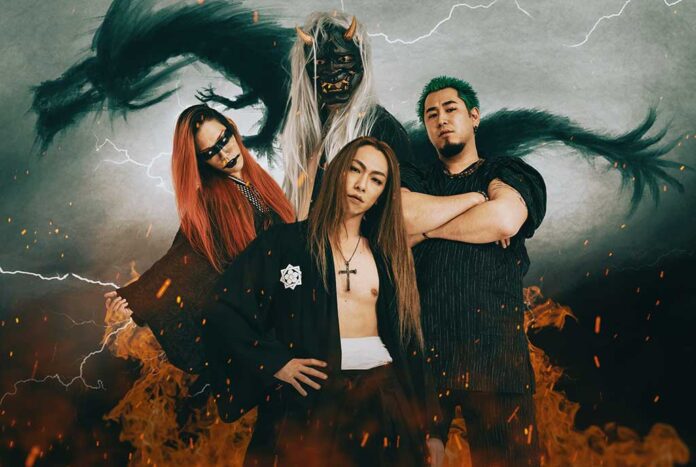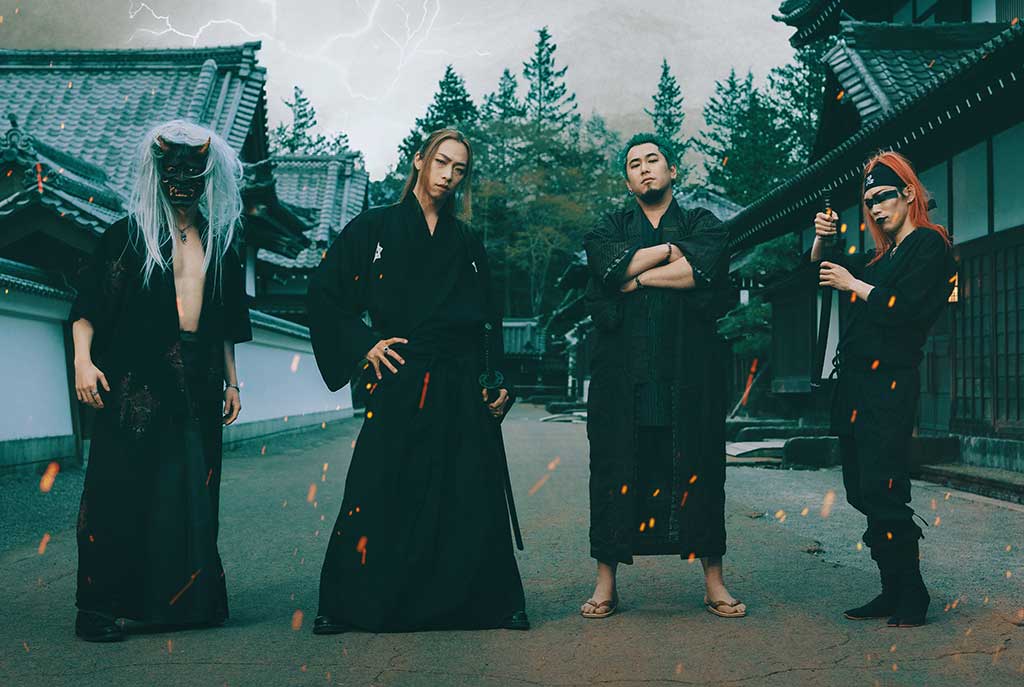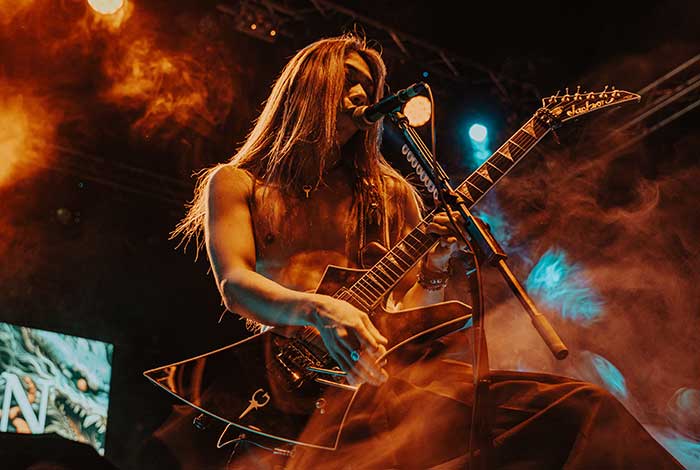
INTERVIEW WITH RYOJI SHINOMOTO
RYUJIN DEFTLY DELIVERS HEAVY METAL and blazing guitar wizardry from Japan with their upcoming self-titled album, RYUJIN, out January 12, 2024 via Napalm Records. Blending both Japanese and English lyricism and featuring production and several guest features by Matthew Kiichi Heafy (Trivium), RYUJIN’s high speed riffs and breakneck guitar descents pair with traditional Japanese elements on their self-titled album, delivering a sound influenced by everything from ancient orchestral Gagaku to modern anime themes.
“THE BASIS OF MY MUSIC IS NATURE WORSHIP AND A WISH FOR PEACE. THAT’S WHY THE NAME RYUJIN FITS SO WELL”
In previous interviews, you’ve mentioned that the name change from Gyze to RYUJIN was based on a few things, including a common misunderstanding of the name. With RYUJIN being the name for the dragon god of the ocean, what inspired you to choose this name, and how does water and the sea inspire your music?
In the East, dragons are auspicious and peaceful. In the West, dragons are dark and villainous. The dragon god is considered the god of water. Japan is surrounded by the sea. Because of the proximity of mountains and oceans, he probably exists as a god of nature as well. When you go to shrines, you see dragons everywhere. The basis of my music is nature worship and a wish for peace. That’s why the name RYUJIN fits so well. Besides, when you think of metal, you think of dragons, right?

How did you choose the traditional Japanese instruments used on this album, and what traditional Japanese music inspires your writing today?
Before the Covid, I was playing the ryuteki of a gagaku orchestra at a shrine. That’s where I learned gagaku music and tried to combine it with metal. I also learned the shamisen and other instruments naturally from the folk songs I heard in Japan. I have Japanese music in my DNA. However, metal players have no interest in traditional Japanese music and tend to just imitate Western music. We were like that, too, in the beginning. After that, we started performing around the world and wanted to create our own version of Japanese metal. It’s not an easy task, so I’m still trying to research it all the time.
The press release for the album says some songs are inspired by Japanese paintings, idioms, and words of the Ainu people of your home region. Can you delve into one or two specific things that inspired you in this way?
An example is Raijin and Fujin, it’s a famous painting in Japan that depicts the god of thunder and the god of wind. We were singing a song about that, and Matt [Heafy, Trivium] came up with the title. He wrote half the lyrics and I wrote the other half. It’s like me and Matt are Raijin and Fujin! When it comes to Ainu culture, it’s Kunnecup. It means moon god. I didn’t use any specific myths as a motif, but I wrote about the power of the moon. This is because my body is easily affected by the moon. Full moons tend to make me feel irritable and mentally unstable. It’s an unavoidable relationship since we were born on earth.
“MY BODY IS EASILY AFFECTED BY THE MOON. FULL MOONS TEND TO MAKE ME FEEL IRRITABLE AND MENTALLY UNSTABLE”
Your album is also inspired by anime themes, and there is an Attack on Titan theme cover in one of the closing tracks. How does this music inspire your own, and what are your favorite anime series of all-time and now?
That song was also chosen by Matt. He knows more about both old and modern Japan than we do! It turned out really well, so please give it a listen. My favorite recent anime is Golden Kamuy. The story is set in Hokkaido, so you can learn a lot about Ainu culture. Also, Demon Slayer is interesting. A few songs were inspired by Demon Slayer, actually. Both are set in Japan in the 1920s. As for older anime, I liked the Street Fighter anime. I’m especially a fan of Vega and have been growing my hair long since I was four years old.

How did you end up working with Mukai Wataru of the Kansai Philharmonic Orchestra on your album?
We live in the same town and were featured together in the local newspaper about five years ago. After some time, we decided to meet up. We quickly became friends. When I found out that he also liked metal, I immediately asked him to perform as a guest. Recording with him was fun. It’s a great feeling to work with high-level people. He also works on classical music from Western culture and seems to be looking for reasons why Japanese people do it. We were all the same and we had a lot of things in common.
How did you meet Matt Heafy and have him involved in so many songs? Did he inspire your sound and writing in any way?
He was talking about us on X, and I contacted him right away. He really likes our music! It all started from there. We wrote one song together, but he did the vocal direction and the song selection. His biggest work for us was increasing the variety of songs and introducing clean vocals. It opened a lot of new doors for me. He is the pride of the Japanese people. I’ve never met a gentleman like him.
“I TRY TO DIFFERENTIATE MYSELF FROM OTHER GUITARISTS BY ALSO USING ADDITIONAL INSTRUMENTS SUCH AS PIANO OR SHAMISEN.”
It’s clear that your talents as a guitarist and soloist are remarkable. Were there any specific techniques or production choices on this album to test your limits?
Thank you for saying that! I’m still learning, and I want to become a better player. If there’s anything special about it, it’s that I don’t really do guitar solos. I try to differentiate myself from other guitarists by also using additional instruments such as piano or shamisen. Of course, sometimes I need a guitar-like approach and compose while playing the guitar, but I want to create solos and guitar phrases that are as original as possible.
You just wrapped up a tour with PAIN and Ensiferum in Europe. How was your experience on this tour and do you have any plans to tour in North America in 2024? And if you had to choose three current bands that you could be billed with on tour, who would they be?
It was amazing! All the bands and crew were amazing. Especially since we shared the same bus with Ensiferum, we got to spend a lot of time together. I exchanged information with them about Finnish and Japanese music and learned a lot from them. I don’t know what will happen in 2024, but I’ve signed with an agent in North America, so I think we’ll go on tour someday. If I had to choose three, it would be Trivium, and I would love to tour with Ensiferum again. Lastly, maybe The Hu in Mongolia? Japan vs Mongolia is super interesting!
Is there anything specific that you wish international audiences should know about RYUJIN that you feel is important to new fans?
Are we the world’s first samurai metal band? Also, it’s music, so I want you to listen to the songs and watch the music videos. I also want them to be interested in Japanese culture. Above all, we would be most honored if you felt that our Japanese metal sound is also cool.




















